Best water filters for RV. Are you in the market for the best water filters for your RV? If so, look no further! We have a great selection of the best options on the market. Whether you’re looking for something basic or more luxurious, we have the perfect water filter.
Table of Contents
What are water filters?
Water filters serve as filters by trapping chemical compounds, physical contaminants, and living organisms within pores. Water can be filtered to different degrees for differing purposes, such as irrigation water, public drinking water, aquaria, and the chemical supply of manufacturing. Water filters remove contaminants, including heavy metals, microbes, suspended solids, and dissolved compounds.
Water filters and why they are necessary
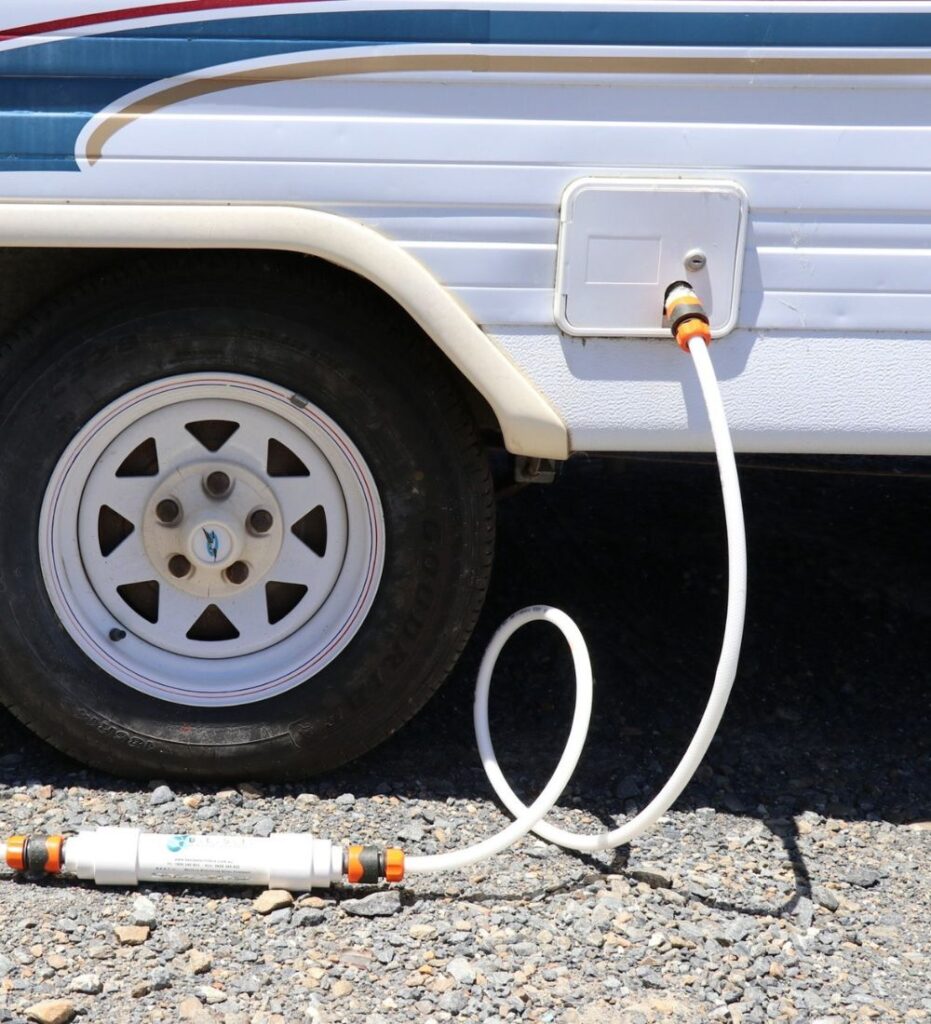
RV owners should know the importance of good water filtration. This will not only improve their drinking water, but it will additionally protect them from bacteria and other dangerous contaminants.
With all the different water filters available, deciding which is best for you can take time. We created this guide to the best water filters for RVs. After reading this, you will be able to make a more informed choice of water filter for your needs.
Remember a few things when choosing a water filter for your RV. First, consider the size of the unit. Many RVs have limited space, so selecting a filter that will fit your available space is essential. Another important consideration is the type of filter media that the unit uses. Carbon is the most common media type, but some filters use other materials like ceramic or sediment.
Another thing to take into account is the flow rate of the unit. This is especially crucial if you’re going to use your RV filter for drinking water–you’ll need to be sure that the team can handle your water needs.
With this guide, finding the best RV water filter will be a breeze! There are a lot of great water filters on the market, so take your time and choose the one that’s right for you.
The different types of water filters available
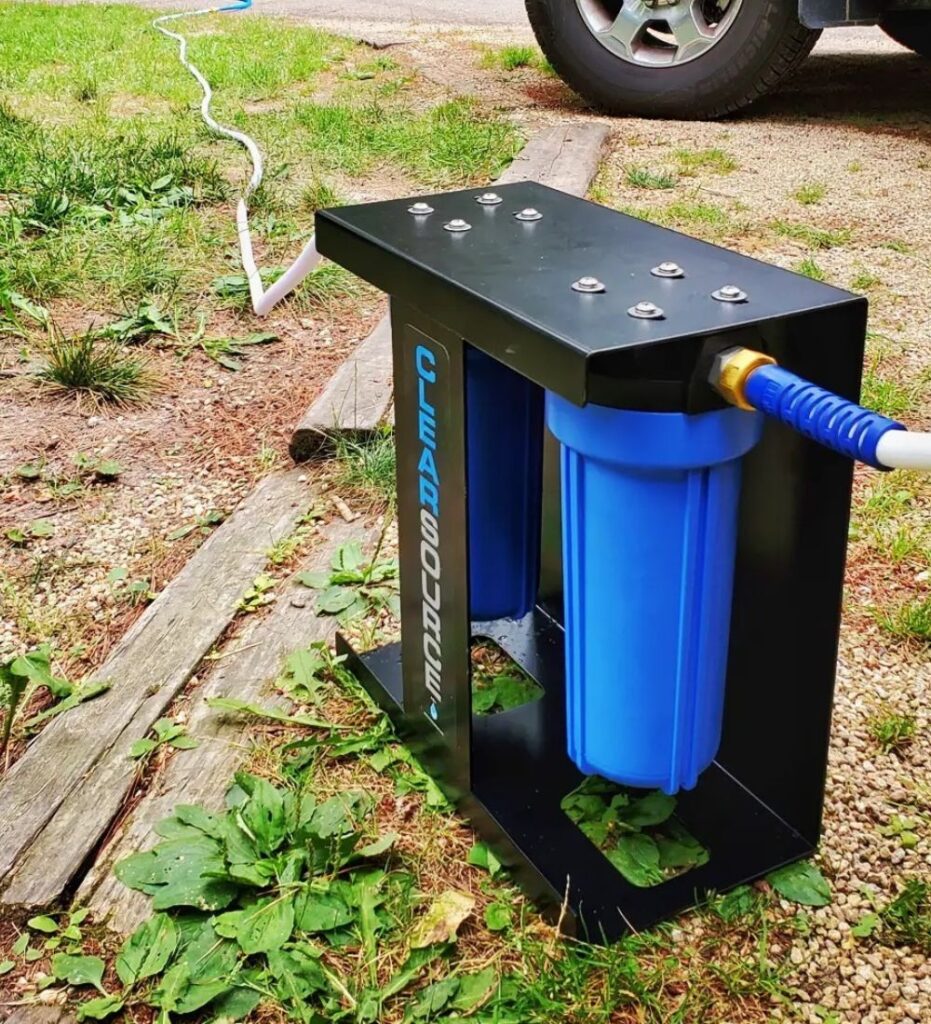
The market for water filters is diverse, offering many products with their own unique set of pros and cons.
The most popular type of water filter is the activated carbon filter. These filters use charcoal to remove impurities from water and are highly effective in reducing chlorine, bad tastes and smells, and organic chemicals. Carbon filters can be used in different settings, such as under-sink filtration systems, whole-house systems, and even some pitchers and faucet-mounted filters.
Reverse osmosis is another popular water filtration method. With reverse osmosis, a semipermeable membrane is used to remove impurities from water. This system is usually employed when the water being supplied is known to be contaminated with dissolved solids. An example would be in rural areas where wells are the primary water source.
UVGI, or ultraviolet germicidal irradiation, is a disinfection method that uses ultraviolet light to kill or inactivate microorganisms. This technique is used in various applications, such as food, air, and water purification.
Ion exchange is a process that employs ion-exchange resins to eliminate impurities from water. These resins attract and bind to pollutants in the water, effectively removing them from the supply. Ion-exchange systems are often used in whole-house filtration systems and can remove various contaminants, such as heavy metals and dissolved minerals.
Which water filter is best for an RV?
With all of the different types and brands of water filters available, it can take time to decide which one is best for your RV. That said, there are a few key factors to remember that will help you make the right choice.
The first step is to decide which type of filter you want. There are two primary types of water filters for RVs: whole house and point-of-use (POU). Whole house filters are installed where the direct water input for your RV is located, and as a result, all the water that enters your unit will be filtered. POU filters are smaller and can be installed directly at your faucet or showerhead. Only the water used at that specific fixture will be screened.
After that, you must pick which pollutants you want to eliminate from your water. The most frequent contaminants in RV water are chlorine, bacteria, and lead. Some filters can take out other pollutants like cysts (e.g., Giardia and Cryptosporidium), fluoride, and VOCs (volatile organic compounds).
Lastly, you need to pick which filtration method you want. The three primary filtration methods are mechanical, chemical, and ultraviolet (UV). Automatic filters use a physical barrier to capture pollutants. Chemical filters use activated carbon to adsorb contaminants, and UV filters utilize ultraviolet light to kill bacteria and viruses.
After taking all of these factors into account, you should be able to choose the best water filter for your RV.
Best Water Filters for RV
We needed to be very careful when examining different RV water filters, disregarding any aspects that we thought would be irrelevant. Let’s consider the needs that we found each water filter excellent at, as well as those things we hated about them. We’ll create a buying guide using the observations we’ve made.
1. Best inline water filter for RV
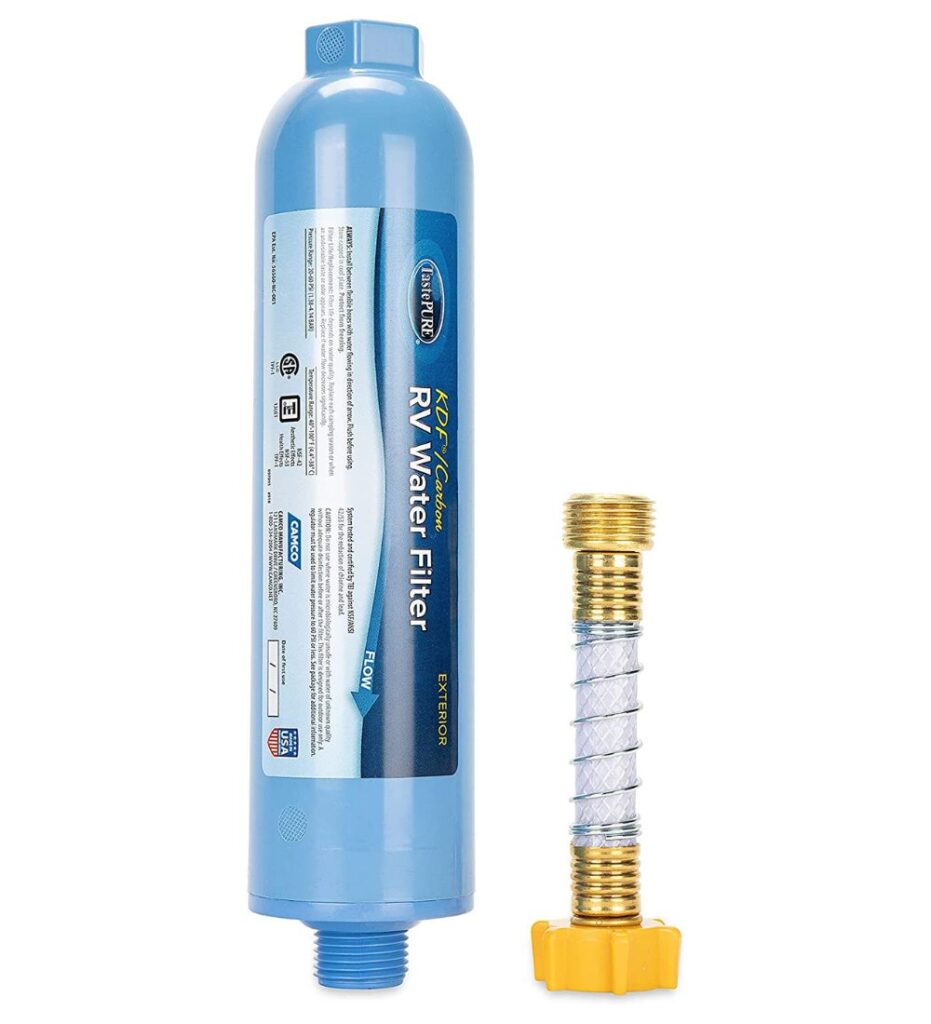
The Camco TastePure filter is an outstanding option for a water filter for RVs. It is easy to install and is available for an affordable price. This is an inline water filter that contains an activated carbon filter. This component removes sediments and improves the flavor of your water supply by reducing chlorine content.
This accessory can also act as a filter, being detached and connected to any standard garden hose for use in boats, trailers, gardening, or other applications. This unit has a sediment filter with a 20-micron rating. It contains potassium permanganate granules that function to prevent the growth of mold and mildew inside the filter when you are not using it.
The Camco filter is designed to eliminate metal salts, hydrogen sulfide, iron, lead, mercury, and other hazardous substances. It is intended to be replaced every six months, but this makes it especially convenient and affordable.
2. High flow RV water filter
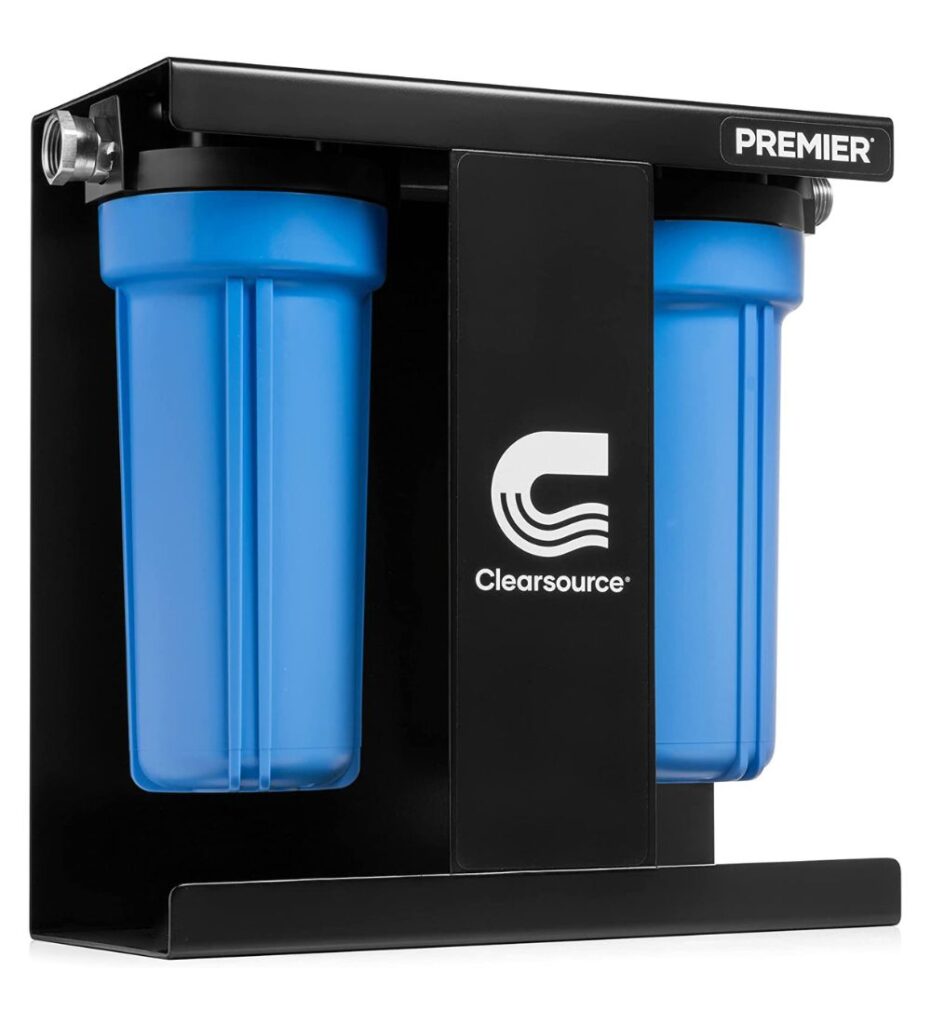
Eventually, you’ll enjoy our latest offering, the Clearsource 2 filter package, if you can cover small expenses. It comes with two filters that are attached to a robust steel stand. The stand next goes from the water source to your RV, using a three-stage purification process for the best outcome.
During the first stage of the filter, particles up to 5 micrometers in size are removed. Then, the 2nd filter is utilized to eliminate water-soluble contaminants and chemicals, such as chlorine. The last stage concentrates on taste, attained through coconut shell-activated carbon. The filter is rated to treat up to 2,000 gallons of water.
3. Best Value RV water filter
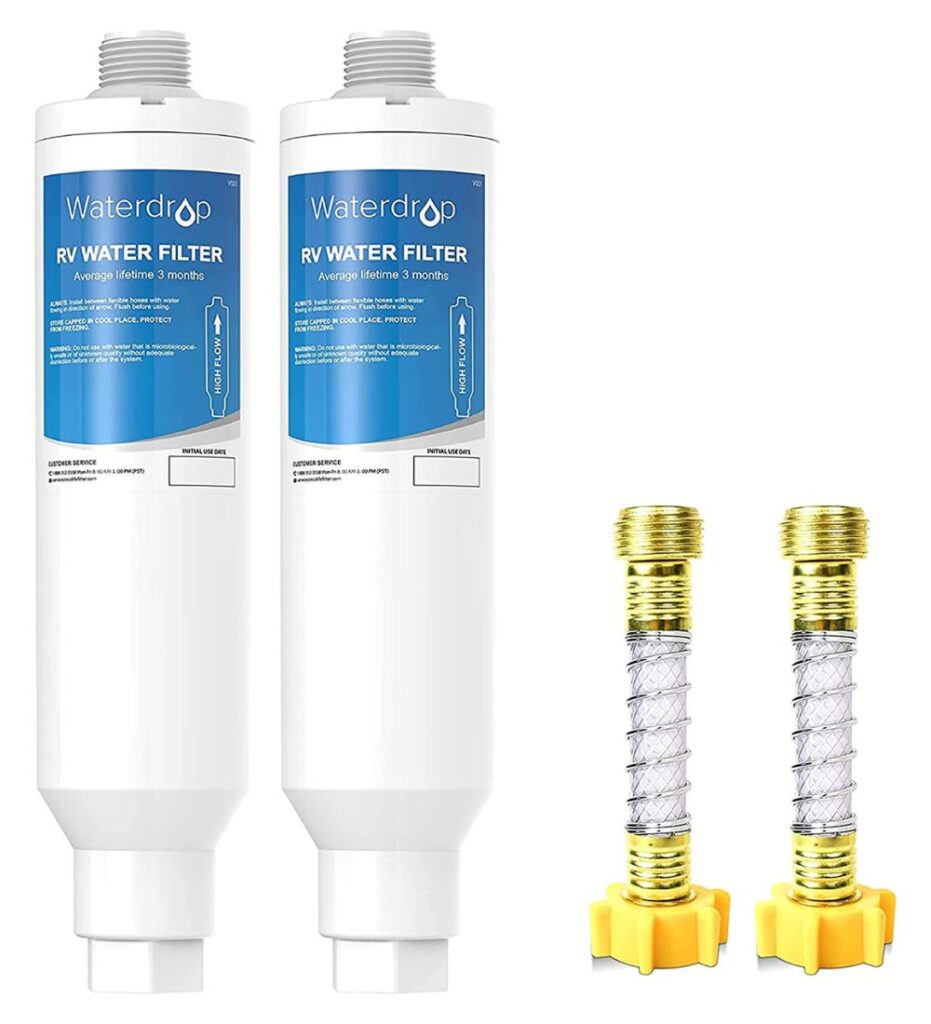
The Waterdrop is the best water filter for the money, regardless of whether you need something sensible. This will keep your subspaces clean for an additional approximately one camping season. The unit is rated to last three months and utilizes a multi-stage gathering of liquids to maximize the model’s effectiveness.
The Kinetic Degradation Fluxion (KDF) process ensures clean drinking water that tastes and smells good. It contains Advanced Granular Activated Carbon (GAC) that can remove sediment particles larger than 20 microns, thereby eliminating common chemical contaminants like chlorine, arsenic, and fluoride.
However, buyers may still wish to take the possibility of relatively low water pressure into context when purchasing this filter. The filter works fine, but because RVs often have low water pressure, to begin with, this is something to keep in mind.
4. Best under sink filter
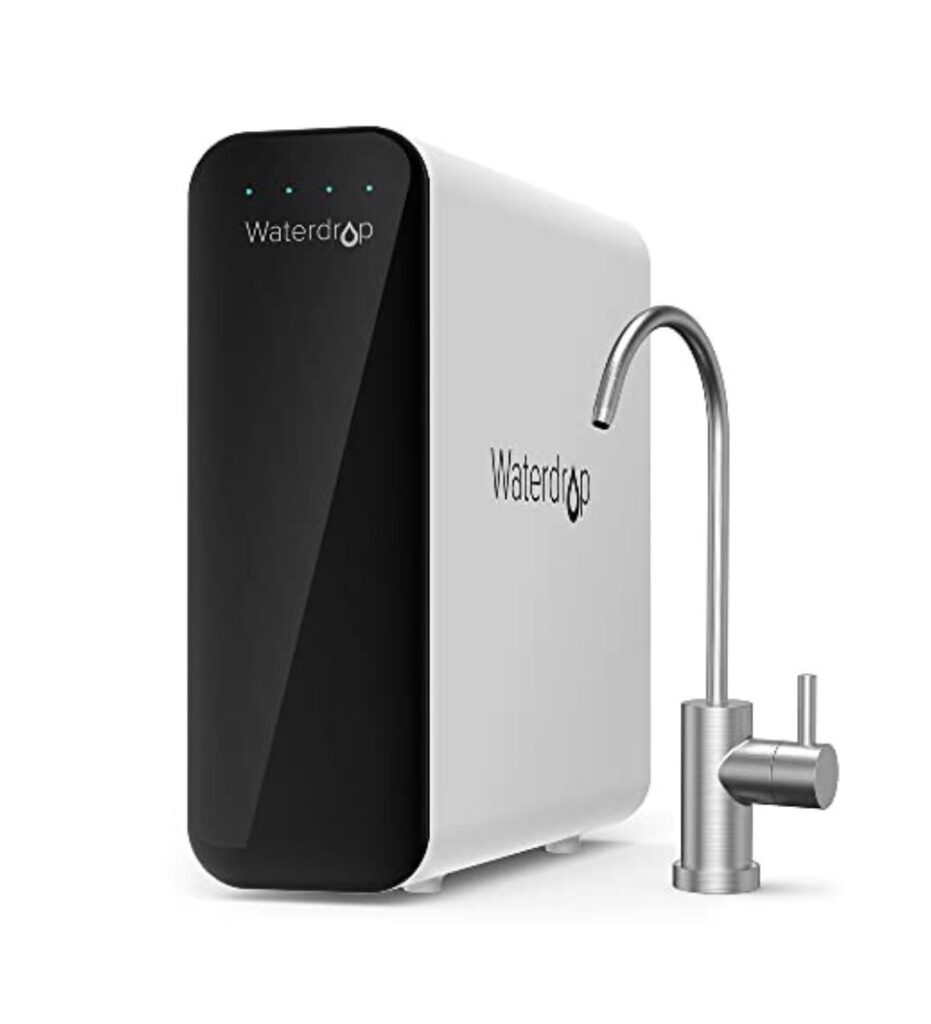
A water filter sufficient to sit underneath one or two sinks in your RV is an excellent alternative if you only require a water filter. The Water Drop TSU 0.01 Micron Filter System is rated to last up to two years and is very effective at trapping contaminants.
The 0.01-micron filter component removes all dirt, sediments, bacteria, protozoa, and other contaminants from water before coming out of your faucet. Once installed under your sink, it can be installed quickly and easily without requiring you to remove the entire unit. The WaterDrop Veil also features Smart Technology that alerts you about water quality and working mode.
The drinking water quality gauge enables you to be more meticulous when monitoring filter replacements and assess the filter setup’s effectiveness while traveling. Provided that you have a filter inside the integrated water line in the filter system, it’s pretty simple to incorporate the system into your RV.
5. Best three-canister water filter

Consider the benefits of a three-canister water filter depending on how often you go to locations containing a lot of toxic pollutants. And the Frizz Life Under Sink Water Filter System unit is one of the best in the market these days.
It’s made to be mounted beneath your kitchen or bathroom sink, so it won’t take up unnecessary space and doesn’t go into a recreational vehicle’s refrigerator. You won’t have to do that with your recreational vehicle’s drinking water hose whenever you set up a new RV park.
Setting the filter in a water cooler will require more time than installing average filters. To meet your filtered demands over a standard filter, you can design cartridges to replace them instead of replacing the whole filter every time.
6. Our pick of the best water filter for RV

The Camco provides a relatively low-pressure barrier that can eliminate impurities, chlorine, blood, sediment, and flavor. It has fulfilled low-lead requirements to guarantee a wholesome drinking adventure. Versatility will not present a problem either. In addition, it can be attached to your RV in no time. On top of that, it can even accommodate typical home hoses. This will allow you to use it to clean your car, for example, or your garden.
This small filtering system uses manganese, titanium, and ceramic to get rid of calcium deposits and make chlorine residue inactive. The package includes the filter cartridge, an installation tool, Teflon tape, and an attachment hose. One particular filter may last for an entire camping season, but actual results will fluctuate based on how often it’s used.
Of course, some users cite that the filter leaves a somewhat chlorine taste, which is a very subjective matter and may depend on the area in which you reside.
How to install a water filter in an RV
By installing a water filter in your RV, you can rest assured that you and your family will have access to clean drinking water while traveling. Several types of water filters are available, so be sure to select one that is made for use with RVs. Follow the steps below to learn how to install a water filter in your RV.
1. Choose where to install the water filter. The most frequent spot is under the sink, but it can also go in the line that provides water to the fridge or ice maker
2. Cut off the water supply to the RV. This is commonly done by twisting a knob or valve near the water heater or beneath the sink.
3. Find the cold water line coming into the RV. This is most likely a white PVC tubing hose that is flexible.
4. Cut the cold water line using a utility knife or PVC cutter. Ensure enough tubing on both sides of the cut to attach new fittings.
5. Connect one end of the flexible tubing from the water filter kit to the cut end of the cold water line using a PVC coupling or mm adapter fitting (this will depend on what type of tubing you have). Use two wrenches to tighten each fitting securely, so there are no leaks.
6. Connect the flexible tubing from the water filter to the desired location for the dispenser or faucet using another coupling or adapter fitting (which will depend on the type of tubing you have). As before, use two wrenches to securely tighten each fitting to prevent leaks.
How to maintain a water filter in an RV
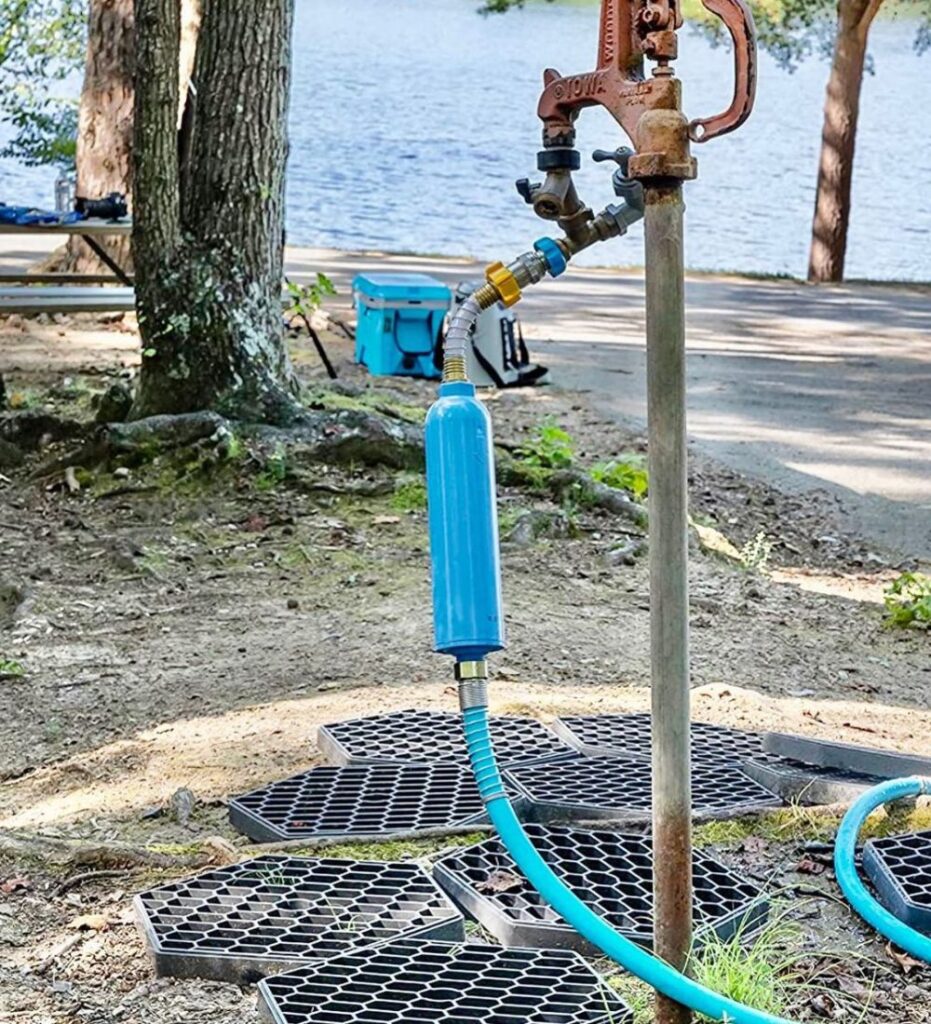
Depending on the type of filter, RV water filters need to be replaced every few months or yearly to ensure that the water in your RV is potable.
Prolong the life of your filter, and it’s essential to clean it regularly. Take the filter out of the RV and rinse it with fresh water at least once a month. If you see that the water flow through the filter has decreased, it means it’s time to get a new one.
Follow the manufacturer’s directions on how to take care of your RV water filter.
What is the healthiest way to filter water?
While most water filters available today are good at taking out harmful pollutants from your water, they use different methods to filter the water. Some more commonly used water filtration methods are activated carbon, reverse osmosis, ultraviolet light, and distillation.
Activated carbon is charcoal treated to make it more absorbent. This makes it ideal for water filters because it can remove many contaminants, such as chlorine, pesticides, and herbicides.
A type of filtration that utilizes pressure to make water travel through a semipermeable membrane reduces the number of impurities in your water by allowing lost particles to end up in a trap while letting only adequate fluid pass through.
Ultraviolet light is often used in addition to other filtration methods to lower the number of contaminants in your water supply significantly. The DNA of bacteria and viruses are destroyed when UV light comes into contact with them, making it impossible for them to reproduce.
The distillation process of filtration uses heat to change water into vapor. This leaves any impurities behind. The steam is then condensed into liquid form, leaving the impurities behind.
Things to consider before choosing an RV Water Filter
RV water filters vary in shape and size. Some are designed for only certain RVs, while others can be used for any RV. A few factors must be considered when selecting an RV water filter.
The first thing you need to think about is the kind of RV you have. For example, you will require a different filter if you have a fifth wheel instead of a travel trailer. The second thing to consider is how many people will use the filter. If, for instance, you have a large family, you will need a filter that can manage more water. Another factor to consider is what type of water you’ll use for the filter. Hard water requires a different kind of filter than soft water.
After you have considered these things, it is time to explore the different types of filters available. The most frequent kind of RV water filter is the canister filter. Canister filters are intended to be attached to the exterior of your RV and use gravity to draw water through the filter. They are easy to set up and don’t need unique tools or expertise. The only downside of canister filters is that they can be bulky and occupy a fair amount of space.
The inline filter is another way to filter your RV water. These filters are set up in the same line as your fresh water supply and work by filtering the water as it comes into your RV. Inline filters are less expensive than canister filters, but they can be more challenging to install. It would be best if you also had some understanding of plumbing to install inline filters correctly.
How often should you change your RV water filter?
To ensure your water is clean and free of contaminants, you should change your RV water filter every six months. You should vary it more frequently depending on how often it’s used. For specific recommendations, consult the manufacturer’s instructions.
RV water filters play a significant role in maintaining your camper or motorhome. Not only do they help keep your water clean and free of contaminants, but they also help extend the life of your plumbing fixtures and prevent mineral buildup in your pipes.
With all the different RV water filters available, selecting one that is appropriate for your particular model is critical. Make sure you follow the manufacturer’s directions for installation and replacement.
Conclusion
The world of RV water treatment systems might seem hard to comprehend. Still, your choice becomes obvious after you learn about the features essential to consider when purchasing any RV water filtering system. Keep you still healthy and happy, and this how-to guide is available for you to use to pick out the best RV water filtration equipment for you!

